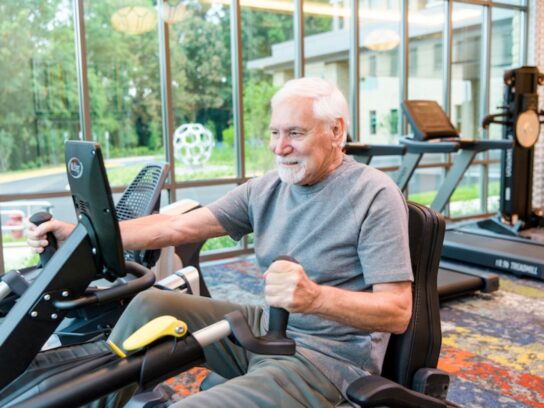
Healthy aging doesn’t mean buying into the latest potion or product that promises to reverse time. It’s about managing your health, living as independent as possible and maintaining your quality of life as you get older.
Training to Stay Strong
Healthy habits are established long before we are seniors. Physical activity is an important component of our physical health. Keeping our bodies strong helps to minimize fall risks, improve mobility, and contribute to a positive mental state. It’s important to understand your body’s changing capabilities and modify your exercise routine when necessary. At The Seneca we have state-of-the-art equipment and personal training to help you maximize your workout and we encourage residents to participate in strength training to prevent and slow muscle loss that occurs after the age of 60.
According to the Centers for Disease Control, seniors should aim to spend 150 minutes each week or about 25 minutes a day doing moderate exercise like walking and adding a strength training exercise twice a week to your regimen.
Shake Your Family Tree
As we age it’s important to know about your family’s medical history. Knowing inherited conditions can help your healthcare provider make suggestions on lifestyle changes to help you live your healthiest life as you age.
The Mind Matters
Staying healthy requires a healthy mind too. Remaining engaged with others whether that is through volunteer work, a dinner group, a book club or even connecting virtually—being social is an important component of a positive outlook and good mental health. At The Seneca our residents have access to OSHER lifelong learning courses, social clubs, curated excursions and engaging events that provide a variety of ways to connect with one another, friends and guests.
Healthy Eating
Staying healthy means coming to the table with the knowledge to make good food decisions. According to the Dietary Guidelines for Americans, women older than 60 should consume 1,600 to 2,200 calories per day and men older than 60 require about 2,000 to 2,600 calories per day. Older adults need to make sure they are talking to their healthcare provider as certain medical conditions and medications may dictate the types of food and even the timing of meals. At The Seneca, our dining services team works with your healthcare provider to ensure your meals are not just a culinary treat but are individually responsive to your needs.
Aging happens. Making sure you maintain your health as you age is something you can affect by supporting your body and mind.


Comments are closed.